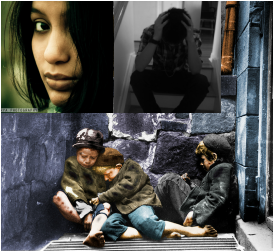
Why? Is the Grinch in full force during the season? Is it because of the dark winter weather that increases the incidence of Seasonal Affective Disorder (SAD)? Certainly those may be some reasons, but it appears to have more to do with unrealistic expectations and excessive self-reflection for many people.
For some people, they get depressed at Christmas and even angry because of the excessive commercialization of Christmas, with the focus on gifts and the emphasis on "perfect" social activities. Other get depressed because Christmas appears to be a trigger to engage in excessive self-reflection and rumination about the inadequacies of life (and a "victim" mentality) in comparison with other people who seem to have more and do more. Still others become anxious at Christmas because of the pressure (both commercial and self-induced) to spend a lot of money on gifts and incur increasing debt. Other people report that they dread Christmas because of the expectations for social gatherings with family, friends and acquaintances that they'd rather not spend time with. And finally, many people feel very lonely at Christmas, because they have suffered the loss of loved ones or their jobs.
I have noticed that at Christmas time I struggle more with anxiety and depression than at any other time of the year. I know it will pass, I just have to ride it out. But what is it about the holidays that makes us nuts? even people without mental health issues? My life is good, my family has all that they need and there is no logical reason for the anxiety. So where does it come from? What is it about this time of year that exacerbates the anxiety?

What Causes Holiday Stress? First, ask yourself this: What about the holidays gets you down? Once you cut through the vague sense of dread about family gatherings and identify specific problems, you can deal with them directly. For many people, holiday stress is triggered by:
- Unhappy memories. Going home for the holidays naturally makes people remember old times, but for you the memories may be more bitter than sweet. “During the holidays, a lot of childhood memories come back,” says Duckworth, who is also an assistant professor at Harvard University Medical School. “You may find yourself dwelling on what was inadequate about your childhood and what was missing.” If you associate the holidays with a bad time in your life -- the loss of a loved one, a previous depression -- this time of
year will naturally bring those memories back. - Toxic relatives. Holidays can put you in the same room with relatives you avoid the rest of the year. People struggling with depression may face stigma, too. “Some relatives don’t really believe you’re depressed,” says Gloria Pope, director of advocacy and public policy at the Depression and Bipolar Support Alliance in Chicago. “They think you’re just lazy, or that it’s all in your head. It can be really hurtful.”
- What’s changed. The holidays can highlight everything that’s changed in your lives -- a divorce, a death in the family, a son who’s making his first trip back home after starting college. Any of these can really unsettle a gathering and add holiday stress.
- Lowered defenses. During the holiday season, you’re more likely to be stressed out by obligations and errands. It’s cold and flu season and your immune system is under assault. It’s getting dark earlier each day. You’re eating worse, sleeping less, and drinking more. By the time the family gathering rolls around, you’re worn out, tense, and fragile. The holiday stress makes it harder to cope with your family than it might be at other times of the year.
- Others’ anxiety, depression and unhappiness are simply biological. In the month of December, it gets dark early and a depressing feeling can easily cripple in, especially for those people who have been moving in and out of depression for a long time "Biological” because studies conducted by researchers from the University of Toronto and the Medical
University of Vienna show that the serotonin levels (serotonin is the hormone responsible for human happiness and well-being) are lower around the brain cells during the winter
months than in the summer months, which then explains why some people feel
miserable during the winter. - Experts say that the holidays can make people feel out of control. We feel at the mercy of our relatives or steamrolled by the sheer force of family tradition. But you have a say. The key is to take some control over the holidays, instead of letting them control you. For instance, you may find the family obligations of the holidays overwhelming.
- You have to ... ? Really ? do you have to .... ? Instead, encourage yourself/people to stop right there. Do you really have to? Ask yourself, ‘Why am I doing things that make me miserable?" (WebMD). “Think about the reasons.” Suggest that you draw up a list of reasons why you engage in these holiday traditions, and then a list of reasons why you
shouldn’t. Just making a simple pro and con list will remind you that you do have a choice. - The next step is to challenge some of your assumptions. If you enjoyed the holidays differently this year, what would happen? What if you didn’t go to your aunt’s for dinner? What if you didn’t ...
- The key is to be conscious about what you’re doing. This holiday season, don’t unthinkingly do things the same way just because that’s how you always do them. If the old holiday traditions aren’t working, if they’re not making you happy and causing holiday stress, it’s time to do something different.
- Once you’ve taken a clear look at the holidays -- about what works and what doesn’t -- it’s time to make some changes. Focus on the holiday stresses that you can control. That includes making different plans and changing your responses to situations.
If the usual family gathering is causing holiday stress, try something else. you’re too overwhelmed to host, discuss other possibilities with family members. Maybe a sibling
could have the dinner this year.
- Don’t expect miracles. If your holiday anxiety stems from a deeper history of family conflict, don’t expect that you’ll be able to resolve any big underlying issues now. Sure, it’s supposed to be a season of forgiveness and good will. But in the midst of a hectic holiday season, you can’t pin your hopes on leading family members to big emotional breakthroughs. You may be better off focusing on your own state of mind and confronting difficult issues during a less volatile time of year.
- Don’t overdo it. To reduce holiday stress, you have to pace yourself. Long before the family gatherings actually happen, decide on some limits and stick to them. Stay one or two nights at your parents’ house instead of three or four. Plan to drop by the holiday party for a couple of hours instead of staying all night.
- Don’t worry about how things should be. “There’s a lot of cultural pressure during the holidays,” says WebMD. “We tend to compare ourselves with these idealized notions of perfect families and perfect holidays.” But in fact, most people have less than perfect holiday gatherings -- they have family tension, melancholy, and dry turkey food too. If you have negative feelings, don’t try to deny them. Remember that there’s nothing wrong or shameful or unusual about feeling down during the holidays.
- For many people battling holiday stress, changing expectations and behavior can make a big difference. Seasonal affective disorder (SAD), a medical condition, a drug side effect, too much partying, or something else entirely could be the real culprit. Also, some people may write off signs of serious depression as mere holiday stress. It’s unwise -- even dangerous -- to ignore anxiety or depression symptoms for weeks or months in the hopes that they’ll just disappear come January or the new year. So
while holiday stress may be seasonal, depression can be year-round. If your
holiday anxiety seems moderate or severe or is interfering with your job, personal, or home life, talk to your doctor, a therapist or to a counselor to help deal with the symptoms and situation.
Sources :
http://www.hopetocope.com/blog/
http://fearmastery.wordpress.com/2012/11/27/the-holidays-anxiety-and-depression-some-thoughts-for-christmas-etc/
http://www.webmd.com/balance/stress-management/features/home-for-the-holdays-stress-tips
http://www.waleoladipo.com/why-people-experience-anxiety-attacks-depression-at-christmas/
http://www.psychologytoday.com/blog/wired-success/201011/why-people-get-depressed-christmas
 RSS Feed
RSS Feed
